Learning Collaboratives
How to Start Narcan on Campus: A Guide to Opioid Overdose Prevention in Educational Settings - October 21, 2025
The opioid crisis continues to affect communities across the country, including college and university campuses. In response, many institutions are adopting harm reduction strategies, such as implementing naloxone (Narcan) programs to prevent fatal overdoses. This presentation offers a step-by-step guide to launching a Narcan initiative on campus, covering the rationale, planning process, and practical implementation steps.
Through this training attendees will learn how to advocate for institutional support, build partnerships with local public health agencies, train students and staff in overdose response, and navigate legal and ethical considerations. The session will also emphasize the importance of reducing stigma, creating a culture of safety, and aligning campus efforts with broader harm reduction principles. By the end of the presentation, participants will be equipped with the knowledge and tools to initiate or enhance Narcan availability and overdose prevention education within their own educational communities.
This presentation will discuss how to identify common community resources to help students in higher education settings, utilizing a community organization framework. The presentation will provide practical strategies to support student needs related to housing, food, financial insecurities, and other challenges that may interfere with their academic success. Participants will learn how to identify community assets, resources, and programs in their service areas, as well as common best practices for informing students about local community resources and the referral process for accessing those resources. This training is designed for entry-level staff, Benefit Navigators, Housing Specialists, and anyone who helps refer students to local community services.
By the end of the session participants will be able to: (1) identify five sources of community resources, (2) explain the importance of website design, search parameters, and list design on student access to resources, (3) list and explain three best practices for referring students to community resources, and (4) list and explain three behavioral signs that a student may need help with socioeconomic barriers they have not mentioned.
Supporting Student Mental Health Through Community Resource Navigation: How to Build a Resource Base in Your Service Region - August 5, 2025
A Self Celebration: Honoring the Work We do and the Impact We Have - June 5, 2025
“inner critic” and use strategies from positive psychology to cultivate joy + pleasure, to honor our successes and to promote thriving.
It's Not Easy Being Green - May 19, 2025
The Green Dot Program is ultimately about mobilizing people across settings and contexts to create safe, healthy, and respectful spaces. By equipping individuals with the knowledge, skills, and motivation necessary to do their part, cultures can shift and all forms of harassment and interpersonal violence can be reduced. This interactive webinar will focus on identifying potentially dangerous situations, while also identifying safe, bystander interventions that can redirect and defuse situations. Ready to use examples will be provided, as well as easy ways to bring this education to your campus.
How to Support Executive Functioning in Education when students have been impacted by Trauma or the challenges of Neurodiversity - May 9, 2025
This is not your typical didactic training on trauma; this is an immersive experience which will include evidence-based strategies to assist school personnel in navigating challenges and situations that create chaotic and dyssynchronous environments for everyone. Knowing how to leverage your own capacity to shift the energy in the space from a power struggle to one of collaboration will be a game changer.
Key Objectives: (1) Participants will deepen their understanding of the impact of trauma on the developing bodies and brains of young adults, (2) Participants will tune into their own nervous system to understand their window of tolerance
and practice using interventions to reset their own nervous system,(3) Participants will develop a greater curiosity for the root causes of challenging behavior and emotional dysregulation, and (4) Participants will gain a new understanding about relationships in respect to rupture and repair, co-regulation/social regulation/self-regulation and interventions that drive collective wellness.
AFSP Rural Suicide Research Connection Recording - April 2025
The ICC TAC was asked to share the following information from AFSP.
AFSP is the nation’s leading private funder of suicide prevention research. You can watch the April Research Webinar to see key insights from this year’s findings on rural suicide.
Personality Impairment: Working with Challenging Individuals - March 27, 2025
Personality Impairment: Working with Challenging Individuals - March 27, 2025
This presentation reviews personality traits and offers suggestions on how to effectively work with individuals who may present with challenging traits to accomplish mutual goals.
Dr. Barboza is a clinical and consulting psychologist who provides monitoring, consultation, training, and expert opinion regarding the delivery of mental health services in correctional settings and cultural/emotional wellness. Learn more about Dr. Barboza here: https://www.sharenbarboza.com/.
Key Objectives: (1) Review the four basic elements of personality functioning as presented in the DSM-5, (2) Describe personality as following along a continuum of pathology, (3) Employ practical skills to work more effectively with individuals who exhibit challenging personality characteristics.
Understanding ACES, Toxic Stress, and Trauma Informed Care - March 18, 2025
This training is designed for professionals working with communities affected by adversity. Participants will explore the long-term impacts of Adverse Childhood Experiences (ACES) and toxic stress on mental health, brain development, and physical well-being, including their connection to chronic disease and health disparities. The training emphasizes the importance of identifying both trauma and resiliency factors and implementing trauma-informed practices within systems of care to promote healing and reduce barriers.
Key Objectives: (1) Increasing knowledge of ACES and their influence on social determinants of health, (2) Enhancing understanding of how ACES impact mental health, brain development, and their links to chronic illness and early mortality, and (3) Building awareness and skills in trauma-informed care to ensure patient-centered, relationship-focused services that foster resilience and healing.
Building a Trauma Informed Campus: Policies & Best Practices in Community Colleges - March 13, 2025
The learning objectives of this training, presented by Jeanie Tietjen, PhD., include (1) Define trauma-informed higher education by identifying key principles, common misconceptions, and the ways trauma impacts learning, teaching, and academic resilience in community colleges, (2) Analyze the neurobiological impact of trauma on student engagement and academic performance, exploring how concepts like threat response, procrastination, and co-regulation influence learning environments, (3) Apply trauma-informed strategies in pedagogy and campus practices by examining practical tools, including syllabus design, faculty training, campus resources, and institutional policies that support student and faculty well-being, and (4) Develop effective responses to stakeholder pushback and real-world scenarios, recognizing the challenges faced by faculty—particularly minoritized faculty—and implementing strategies to maintain boundaries, equity, and professional sustainability.
Click below to access all slides and event resources.
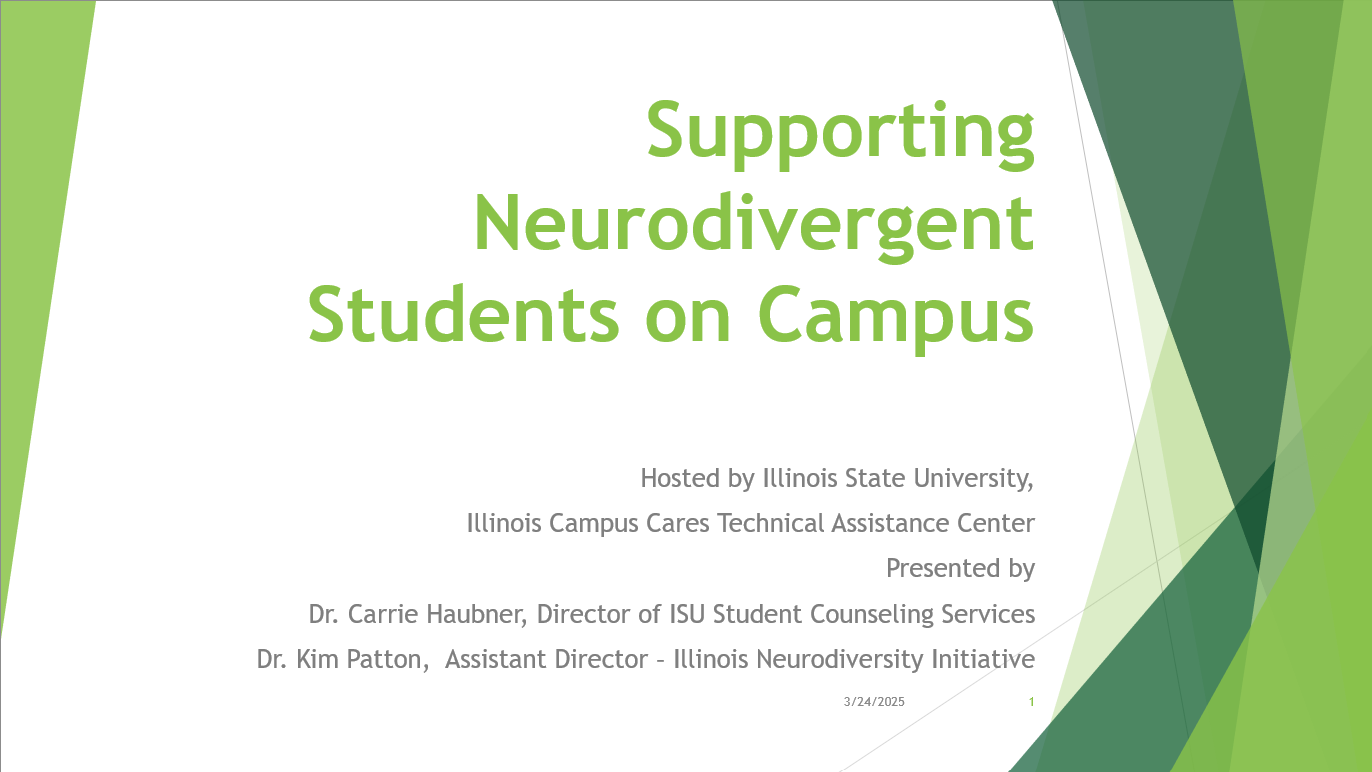
Supporting Neurodivergent Students on Campus - Feb. 7, 2025
This training provides the basic skills for participants to: (1) Describe what a neurodiverse-friendly college campus should include, (2) Describe what effective collaboration with disability services, academic advisors, other support staff, and other campus resources for working with neurodivergent students should look like, (3) Understand and implement reasonable accommodations for neurodivergent students, (4) Understand and implement current inclusive language when working with neurodivergent students, and (5) Increase faculty and staff comfort levels to conduct open communication with neurodivergent students to better understand their needs and preferences.
Understanding 504 & Americans with Disabilities Act: Proactive Strategies for Supporting Students with Mental Health Conditions - January 30, 2025
This training equips direct providers and administrative staff in higher education with tools and resources to proactively support students with mental health conditions in navigating their rights under Section 504 and the ADA. Led by experts from Illinois Doc Assist and the Great Lakes ADA Center, the program covers key areas: utilizing consultation services for mental health accommodations, strengthening referral and linkage processes, and applying evidence-based case consultations to enhance student support.
Participants will gain an understanding of legal protections, including the definition of disability and eligibility under 504 and ADA, while learning to navigate the accommodation process, address denied accommodations, and implement institutional best practices to improve compliance and support for students with mental health conditions.
Click below to access all slides and event resources.
Safe, Fun Sober Events at Colleges: Can Prevention Norming Campaigns be Effective? - November 13, 2024
The ECHO program Safe, Fun Sober Events at Colleges: Can Prevention Norming Campaigns be Effective? was presented by Dr. Stephanie Rose, Associate Professor & Addiction Studies Program Coordinator, and Millie Goins, Assistant Director of Student Wellness & Programs, from the University of Central Arkansas. Their presentation shared their experiences developing campus prevention programs that heavily involve students in the planning, developing and implementation process. They also explained sources of funding and current outcomes.
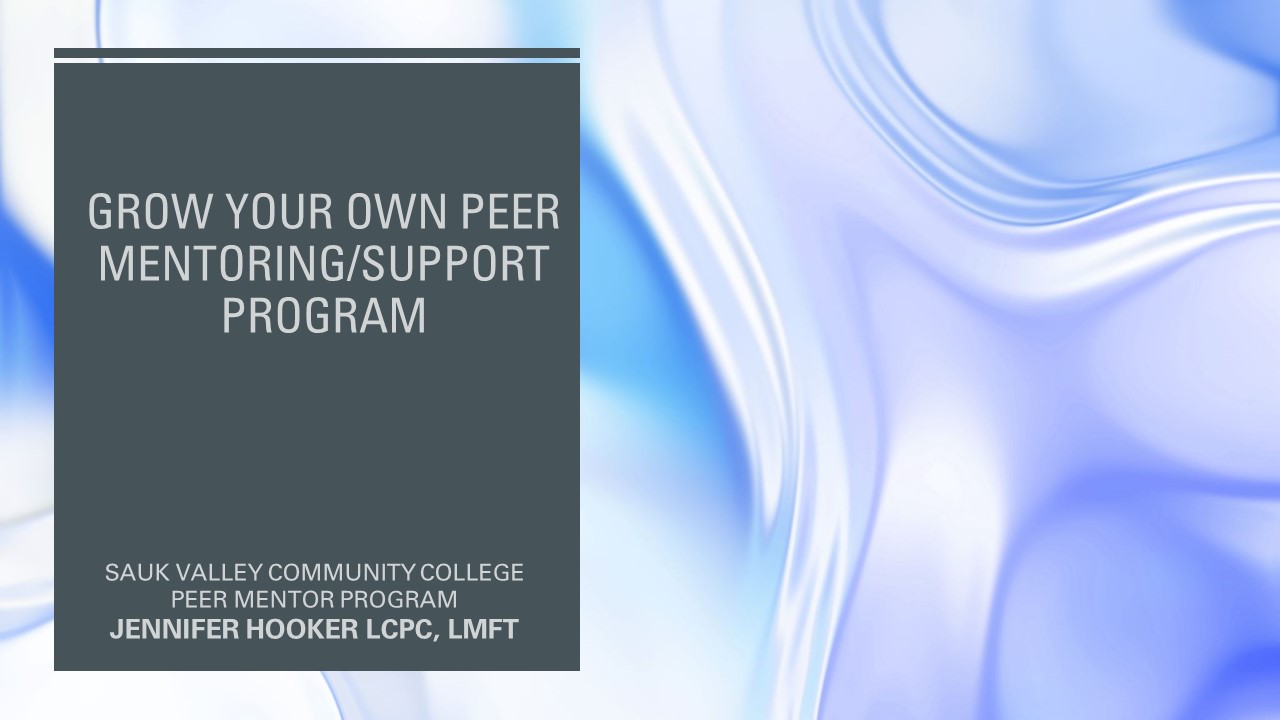
Grow Your Own Peer Mentoring/Support Program – August 5, 2024
The goals of this learning collaborative include (1) ability to explain the importance of having a peer mentoring/support program on their campus, (2) ability to identify at least three ways to measure success of a “Grow Your Own Peer Mentoring/Support Program”, and (3) ability to explain at least three barriers to implementing their own peer mentoring/support program on their campus.
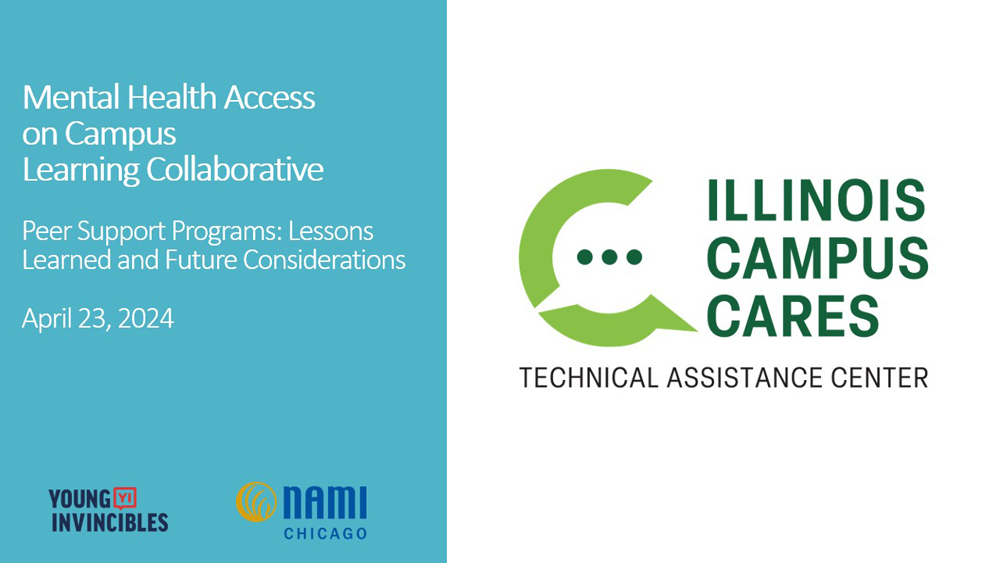
Mental Health Access on Campus Learning Collaborative - April 23, 2024
The goals of this learning collaborative include (1) furthering your understanding of peer support groups on college and university campuses as directed in the MHEAC Act, and (2) obtaining insights and actionable recommendations on peer support program implementation through a Q&A with subject matter expects and engaging conversations with peers from across the state.
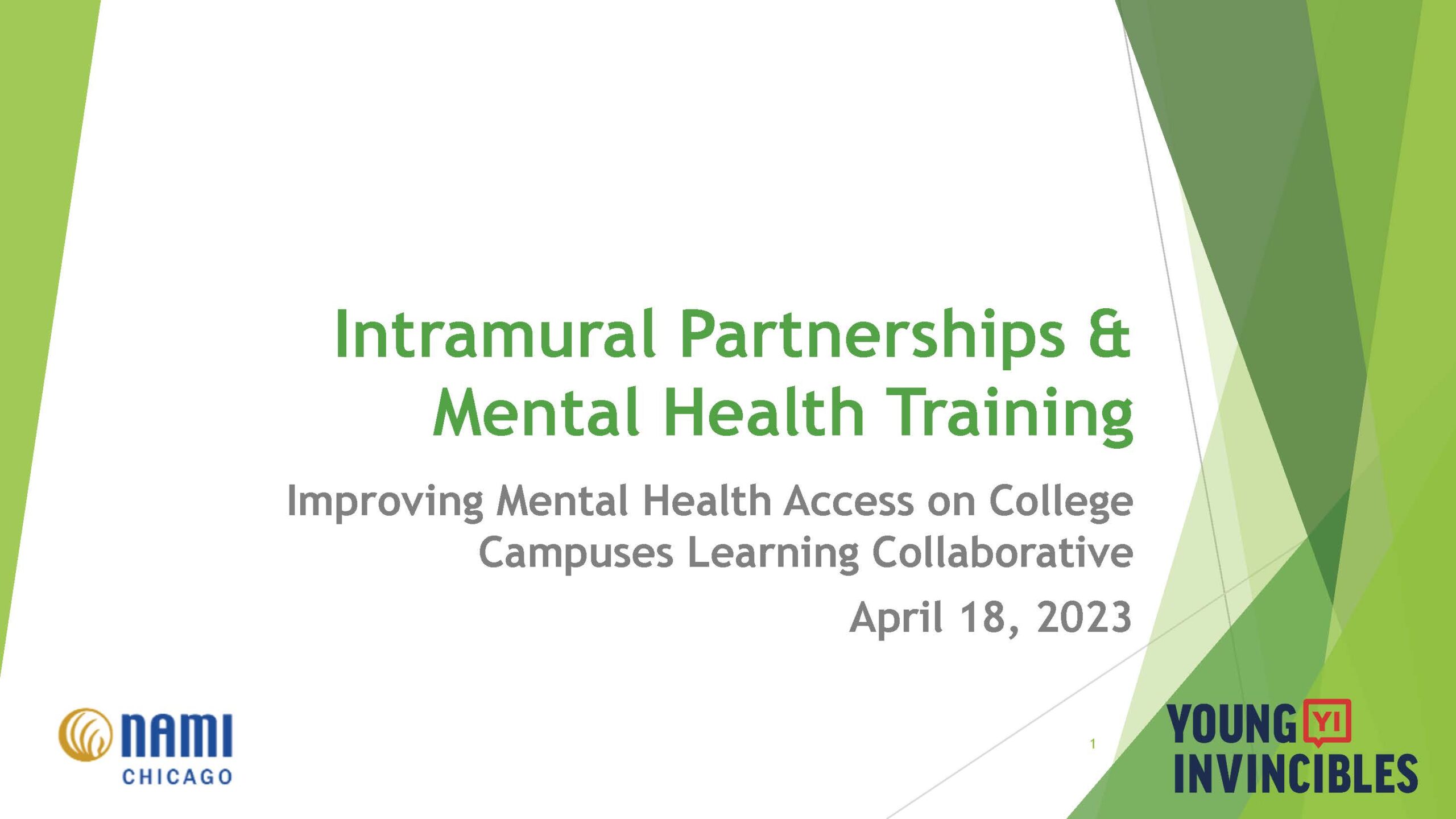
Intramural Partnerships & Mental Health Training - April 18, 2023
The goals of this learning collaborative include (1) Explore current partnerships and mental health training initiatives at public colleges and universities, (2) Identify new strategies for intramural and campus-wide partnerships while responding to current needs of students, and within the capacity of public colleges and universities, and (3) Make commitments for implementing practices to form and enrich partnerships and mental health integration initiatives through exploration of innovative strategies identified by Learning Collaborative institutions.
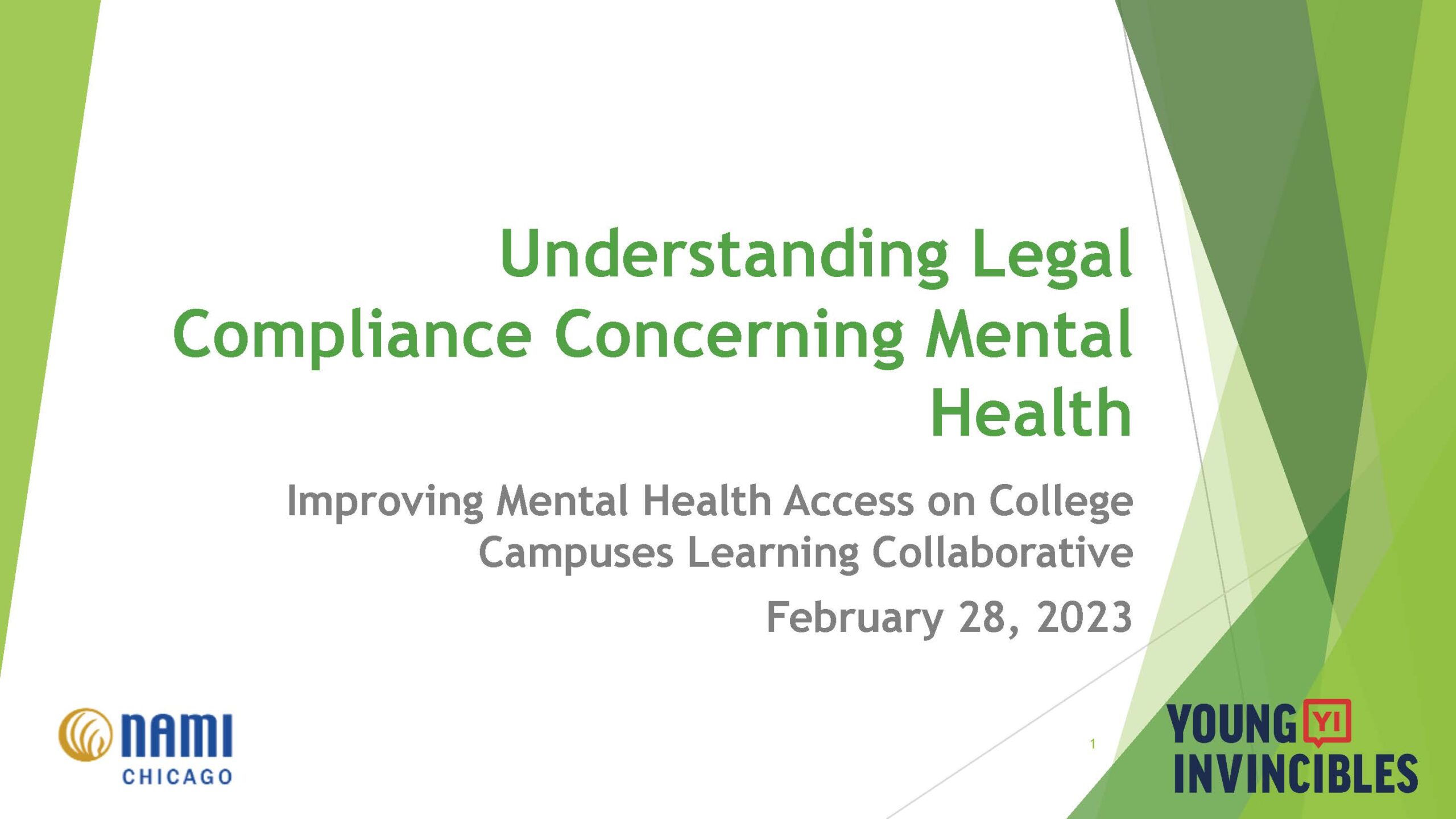
Understanding Legal Compliance Concerning Mental Health - February 28, 2023
The goals of this learning collaborative include (1) Explore current regulations regarding mental health services for public colleges and universities, (2) Identify new strategies for compliance with state and federal regulations while responding to current needs of students, and within the capacity of public colleges and universities, and (3) Make commitments for implementing practices to ensure compliance with mental health state and federal regulations through exploration of innovative strategies identified by Learning Collaborative institutions.
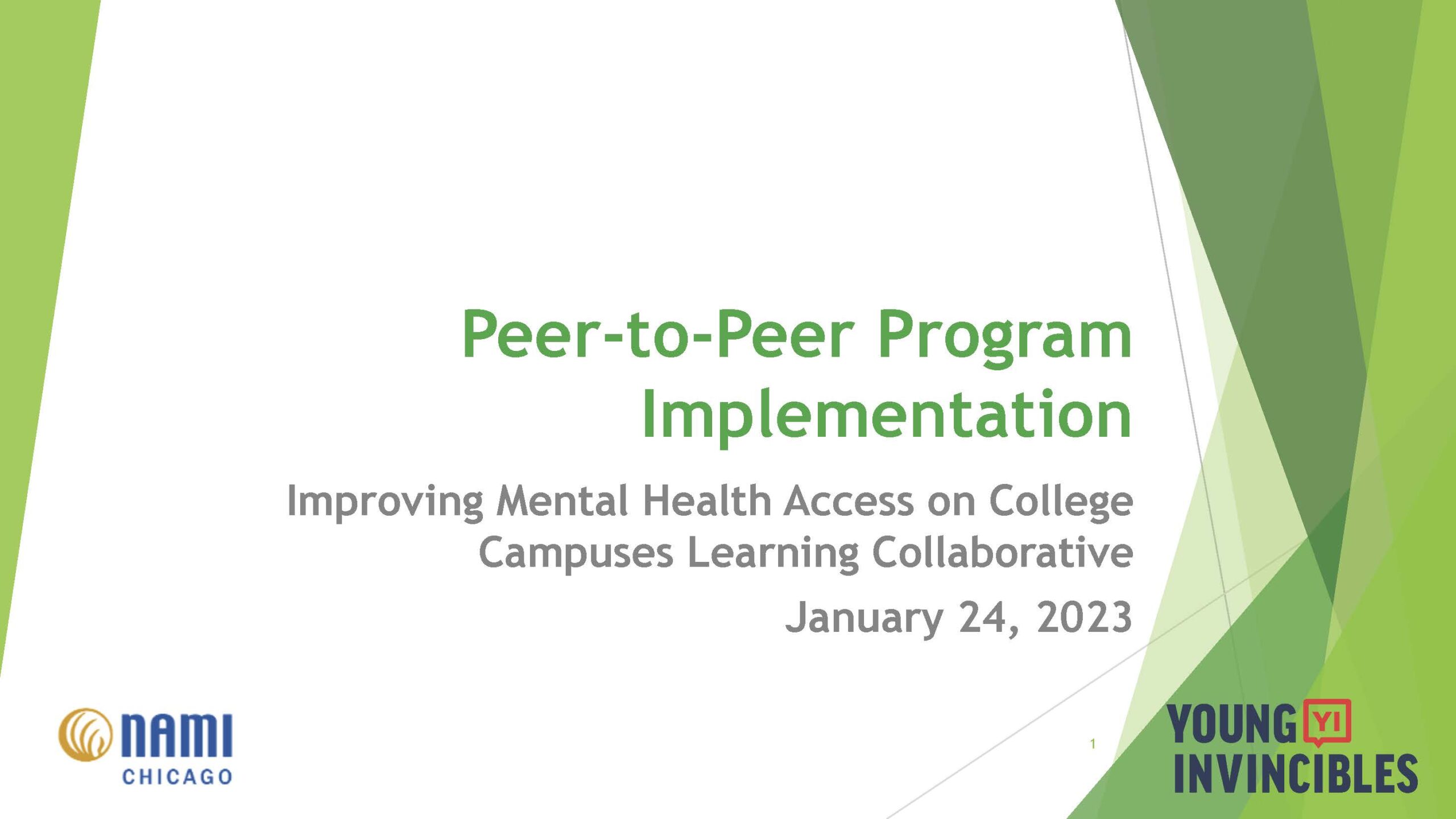
Peer-to-Peer Program Implementation - January 24, 2023
The goals of this learning collaborative include (1) explore current successes and challenges of Peer-to-Peer programs being implemented by public colleges and universities, (2) identify new strategies for implementing Peer-to-Peer programs while responding to current needs of students, and within the capacity of public colleges and universities, and (3) make commitments for implementing Peer-to-Peer programs through exploration of innovative strategies identified by Learning Collaborative institutions.
Campus Mental Health Funding - A Conversation with Legislatures and Students - November 1, 2022
The goals of this learning collaborative include (1) working towards understanding the MHEAC Act and funding that is allocated to Community Colleges and Universities in Illinois, and (2) open discussion with State Senator Celina Villanueva, State Representative La Shawn K. Ford, and Illinois students attending higher education institutions.
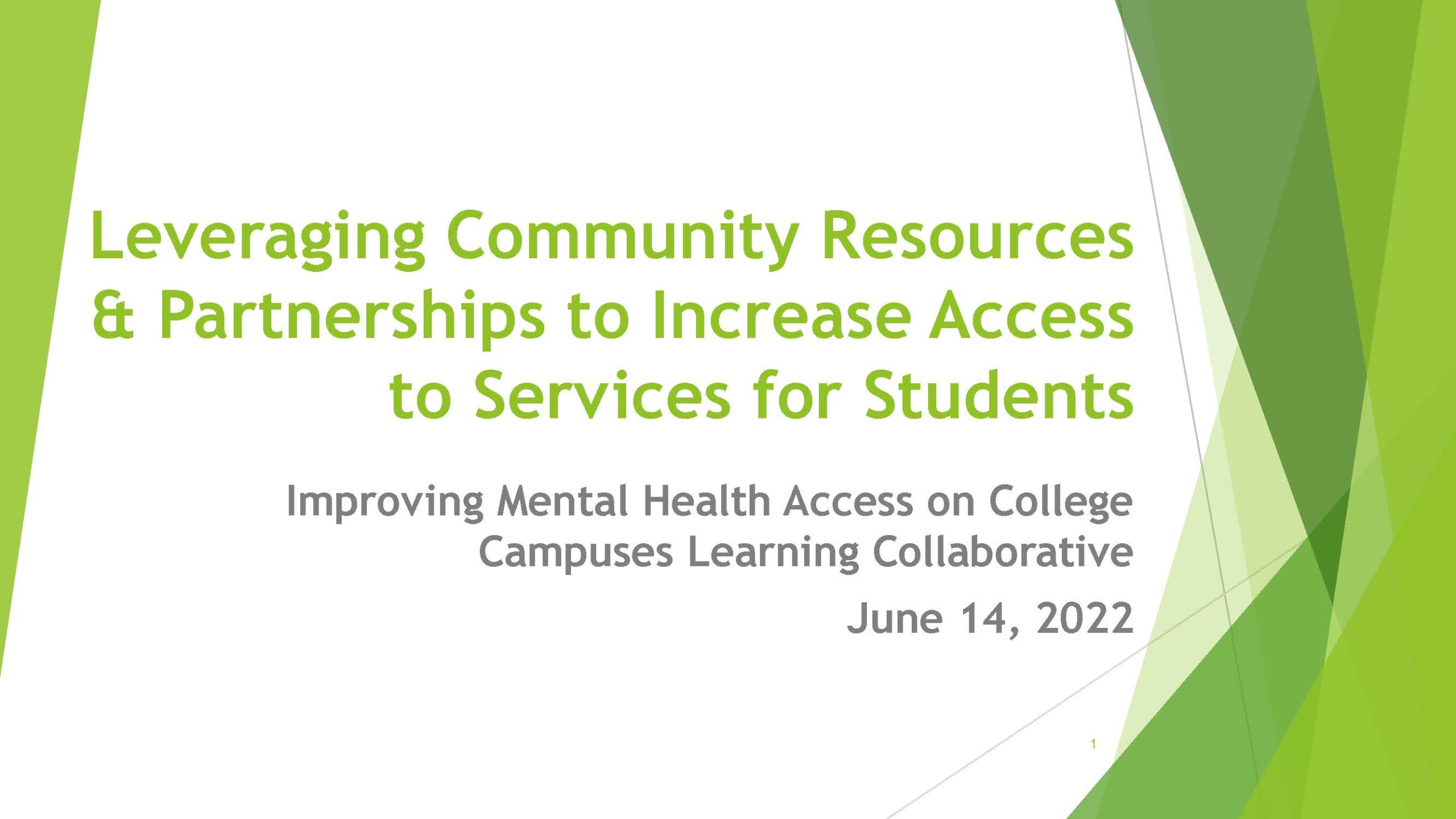
Leveraging Community Resources & Partnerships to Increase Access to Services for Students - June 14, 2022
The goals of this learning collaborative include (1) explore lessons learned, successes, challenges, and best practices in leveraging community resources and partnerships to increase access to services for students on their campuses, (2) learn about both external and internal mechanisms for developing, integrating, and sustaining student focused, community based partnerships and resources to increase access to services for students, and (3) identify new strategies for elevating community resources and
partnerships, while taking into consideration the needs of students, faculty, and other stakeholders within the capacity of public colleges and universities.
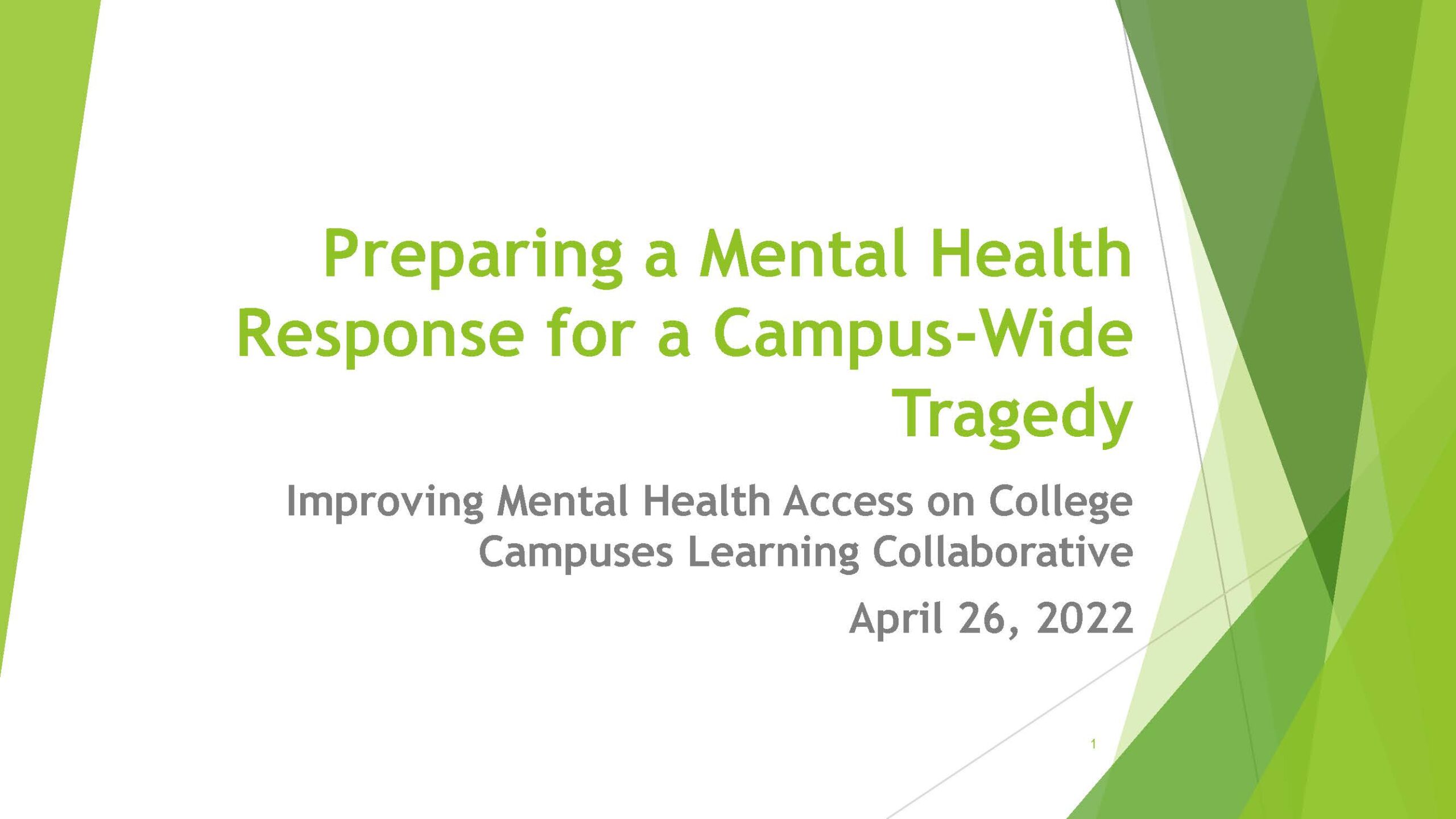
Preparing a Mental Health Response for a Campus-Wide Tragedy - April 26, 2022
The goals of this learning collaborative include (1) explore lessons learned, successes, and challenges in preparing a mental health response for a campus-wide tragedy, (2) identify new strategies for preparing a mental health response for a campus-wide tragedy, taking into consideration the needs of students, faculty, and other stakeholders, within the capacity of public colleges and universities, and (3) share resources for developing mental health responses, including communications plans, for responding to a campus-wide tragedy.
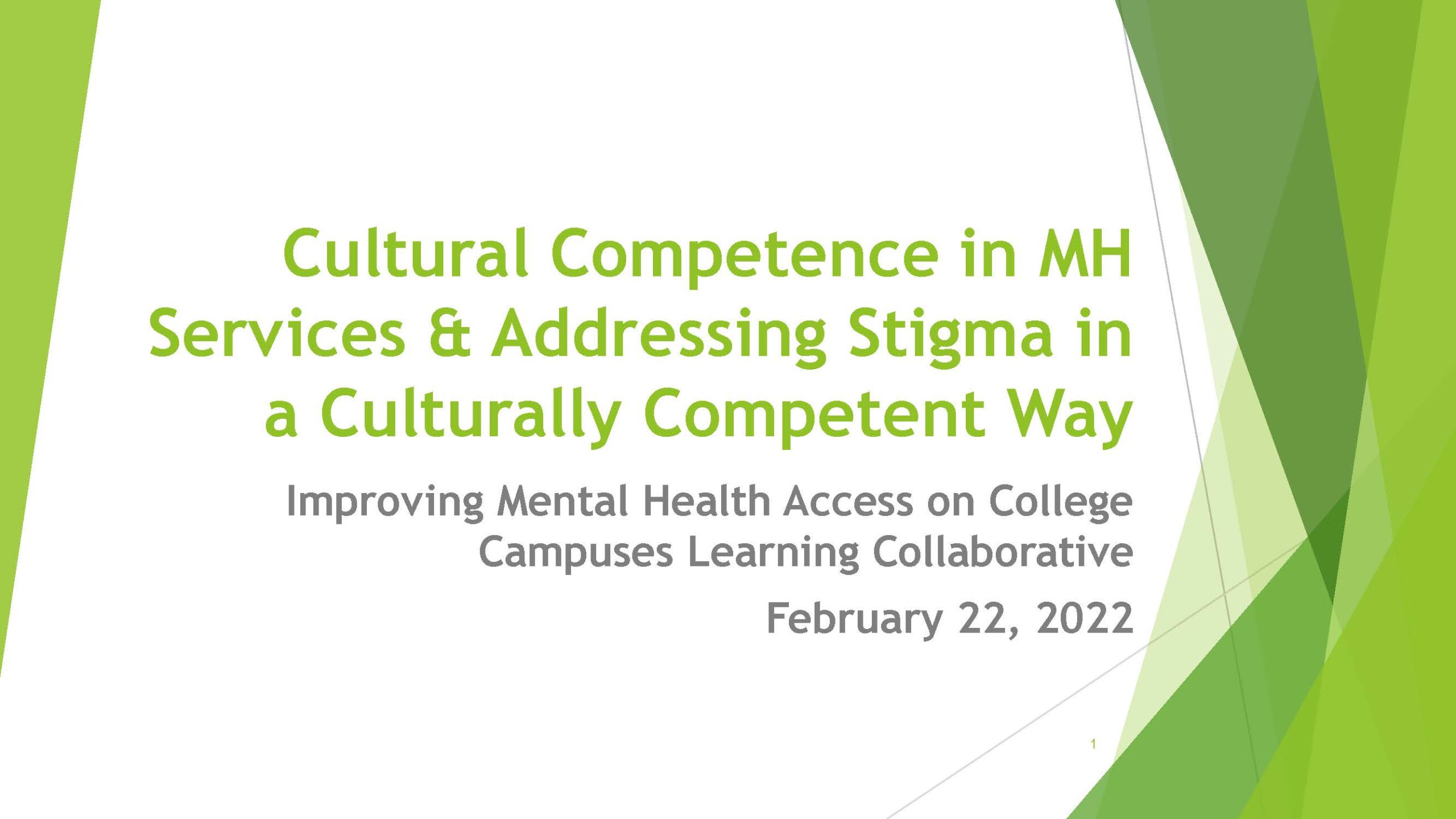
Cultural Competence in MH Services & Addressing Stigma in a Culturally Competent Way - February 22, 2022
The goals of this learning collaborative include (1) explore current successes and challenges in building cultural competence and addressing stigma in a culturally competent manner by public colleges and universities, (2) identify new strategies for building cultural competence and addressing stigma in a culturally competent way, while responding to current needs of students, and within the capacity of public colleges and universities, and (3) make commitments for building cultural competence and addressing stigma through exploration of innovative strategies identified by Learning Collaborative institutions.
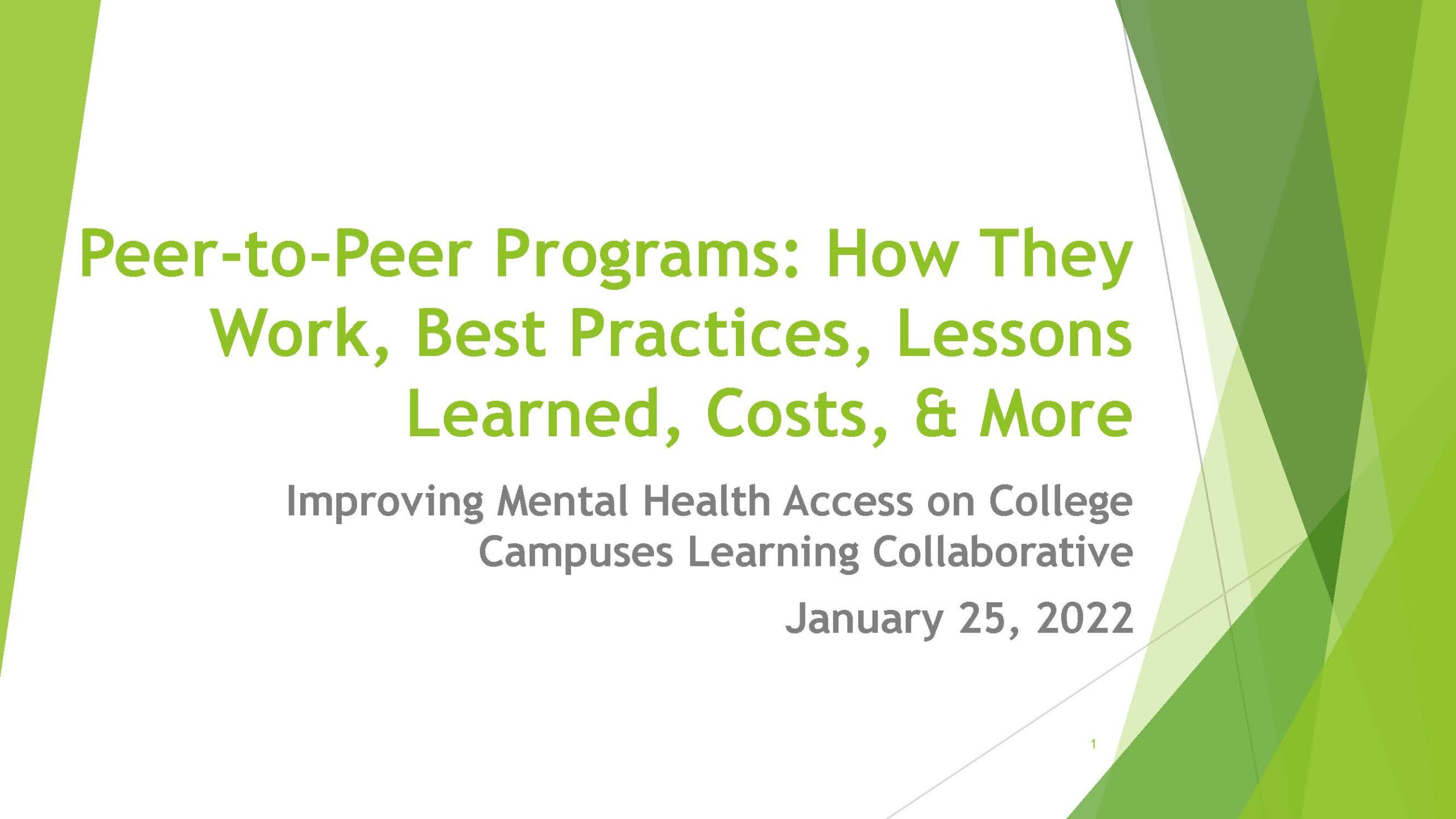
Peer-to-Peer Programs: How They Work, Best Practices, Lessons Learned, Costs & More - January 25, 2022
The goals of this learning collaborative include (1) explore current successes and challenges of Peer-to-Peer programs being implemented by public colleges and universities, (2) identify new strategies for implementing Peer-to-Peer programs while responding to current needs of students, and within the capacity of public colleges and universities, and (3) make commitments for implementing Peer-to-Peer programs through exploration of innovative strategies identified by Learning Collaborative institutions.
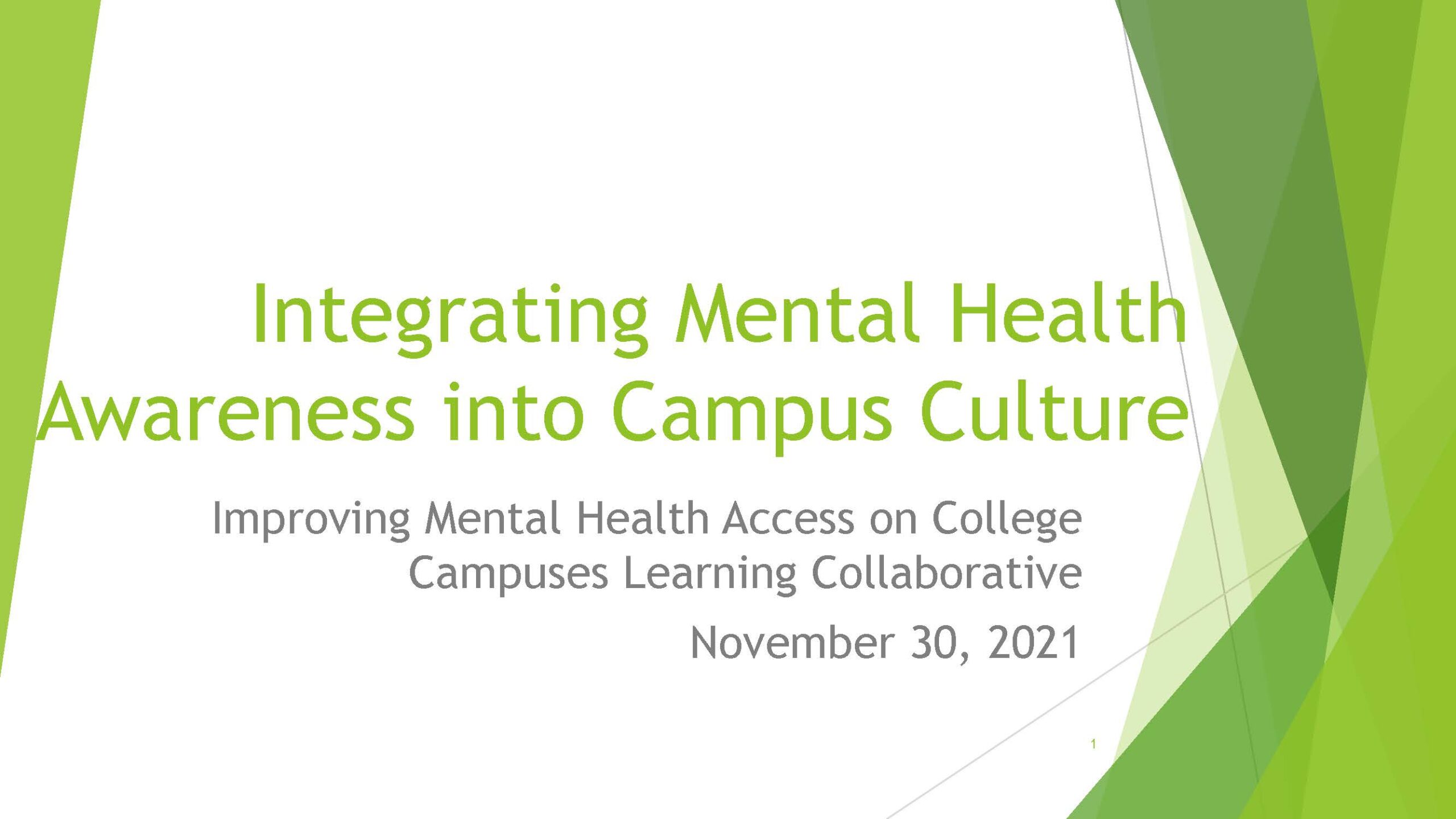
Integrating Mental Health Awareness into Campus Culture - November 30, 2021
The goals of this learning collaborative include (1) Explore current successes and challenges of the implementation of relevant goals of the Mental Health Early Action on Campus Act and practices of public colleges and universities, (2) Identify new strategies for integrating mental health awareness while responding to current needs of students, and within the capacity of public colleges and universities, and (3) Make commitments for integrating mental health awareness through exploration of innovative strategies identified by Learning Collaborative institutions.
